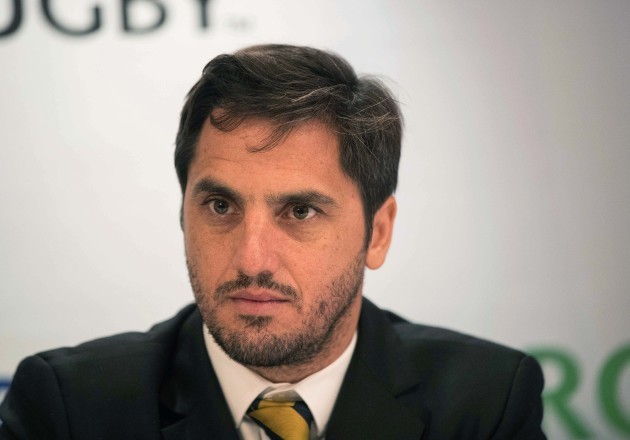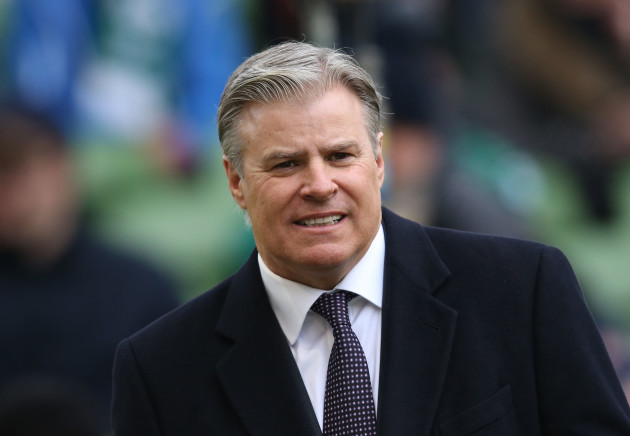THE THREE-YEAR residency rule is a deeply divisive issue in the world of rugby and it seems that the split extends to the very top of World Rugby itself.
World Rugby CEO Brett Gosper yesterday defended the governing body’s recent decision not to extend the residency rule to five years, before newly-elected vice-chairman Agustín Pichot slammed the regulation, stating that “it is wrong.”
There has been increasing unrest among rugby supporters at players being allowed to qualify for any nation based on living in that country for three years.
CJ Stander has recently been welcomed with open arms by many Irish fans, of course, but there has been dissent at the South African native’s inclusion too.
The barreling back row is simply following in the footsteps of the likes of Jared Payne, Richardt Strauss, Rodney Ah You and Nathan White. Look at many of the top nations in the global game and you will see players who have qualified under the three-year residency rule.
If everyone else is going to do it, why shouldn’t the IRFU? Arguably, Irish rugby is becoming one of the most proficient users of the rule.
Bundee Aki is nailed-on to become an Ireland international if he remains in the country beyond the end of his current contract in 2017.
Before leaving his native New Zealand, Aki was extremely forthright in stating that playing Test rugby was one of his reasons for heading to Ireland.
“That’s a big part of my decision to move,” said Aki in 2014. “Hopefully, when the time is right and if I’m playing good footy, hopefully, I can play for the Ireland international team.
“I’ve got to play well before that though. I’m eligible for Samoa. That was another big decision for myself – to see if I would play for them or not. If I play three years over there [in Ireland] and it doesn’t go well, I can always go back to Samoa.”
Aki is also just playing within the rules. World Rugby regulations mean he is fully entitled to play for Ireland from October 2017 onwards.
South African native Quinn Roux has trained with Ireland recently but remains uncapped, while Ulster’s Wiehahn Herbst and Connacht hooker Tom McCartney both qualify next year.
The unions and players are merely acting as the laws of the game allow them to, so the bulk of the criticism in this issue has been directed at World Rugby.
Yesterday in Dublin, the governing body presented incoming chairman Bill Beaumont and vice-chairman Pichot to the media and the former Argentina scrum-half could not hide his feelings on the issue.
His stance on the three-year residency rule was refreshingly honest.
“We need to change it,” said former Argentina scrum-half Pichot. “Somebody will kill me, but we need to change it.
“This is my personal opinion – I think it is wrong. It should be for life, like in football. But, I understand maybe a five-year [qualification period] and it has been discussed and I think it will be on the agenda in the next six months.
“It’s not an urgent part, but it is very important to keep the identity of your national team; it’s very important.
“It’s a cultural thing and an inspiration to young kids. When you have on your team all players who haven’t lived in the country that they represent, it’s not great.
“There are special cases when people move when they’re 10 years old or whatever, but going back to a country when a player is taken, like they are doing now, from an academy in Tonga and putting him to play, say, in an Ireland shirt. I’m against it, I think it’s not right.
“I would love him to play for Tonga, to make money in Tonga and live well. When I see the national anthem and people not singing it, it confuses me a little bit.
“I don’t see in the near future Argentina having players from other countries. That could change and I’m not the owner of Argentinian rugby. The board could say ‘today, we’re going to have an Argentinian Fijian’.
“I haven’t seen one in Argentina, but maybe one day we’ll bring one and he’s playing in Japan at the [2019] World Cup, but I don’t see it happening. It’s a decision that countries take.”
The newly-elected Pichot, who has played a leading role in Argentina’s rise within rugby, is clearly deeply passionate about the issue and his words will be happily welcomed by many supporters who are growing disillusioned with Test rugby.
Only minutes before Pichot outlined his feeling that the three-year residency rule is wrong, World Rugby CEO Gosper had stressed that the organisation does not believe that change is required.
The issue was examined by World Rugby as part of their most recent council meeting, in the wake of the 2015 World Cup, but Gosper said that the majority consensus among member unions was to keep the rule as is.
“There didn’t seem to be any appetite to change that,” said Gosper. “There was a consultation with the unions and at this stage it’s the status quo in that area.”
Gosper said that World Rugby’s view on the matter is “the view of all of the member unions,” but did go on to state that the organisation’s executive committee could have the power to make a change if it felt that it was urgently required.
The World Rugby CEO argued against the notion that the international game is being eroded by the three-year residency rule.
“I think the day that the integrity of the international game, when people don’t believe they’re watching a bona fide international, then you’ve got problem,” said Gosper. “We’ve got no sign of that.
“There is no research or evidence that would back up a movement up [in the required residency period]. That could change over time. The integrity of the image of the sport, as an international sport, with bona fide players and countries playing against each other is definitely intact.
“The erosion we would judge by what the fans feel and you’ve just seen a World Cup where the fans are not thinking ‘this is a hoax’.
“If we see elements of an image erosion around the integrity of the game, it’s something that will have to be addressed. Right now it is what it is and there is no immediate plan to review that, but let’s see what the new group feels.
“It may be reviewed in the future, but right now it’s staying where it is.”
Watch this space.
The42 is on Snapchat! Tap the button below on your phone to add!




